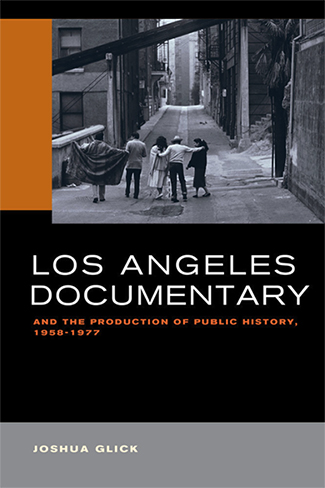 CONWAY, Ark. (April 25, 2018) – Hendrix College Professor Joshua
Glick has published a book exploring the diversity of documentary filmmaking in
Los Angeles between the post-World War II period and the late 1970s and how it
shaped public consciousness.
CONWAY, Ark. (April 25, 2018) – Hendrix College Professor Joshua
Glick has published a book exploring the diversity of documentary filmmaking in
Los Angeles between the post-World War II period and the late 1970s and how it
shaped public consciousness.
Los Angeles Documentary and the Production of Public History,
1958-1977 examines
the documentaries of this time by approaching them in three groupings: the John
F. Kennedy era, the period following the Watts Uprising, and the years
surrounding the United States Bicentennial. Glick covers the work of both
mainstream and alternative documentary filmmakers in a city more commonly
associated with large-scale fiction productions.
“I think LA is a place more known for fiction — most notably Hollywood
— but it has a long history of creating a variety of nonfiction films and
television programs, particularly in the ’60s and ’70s,” he said. “Also, LA is
an incredibly multiracial, multicultural metropolis. The diverse communities of
the city are often obscured by Hollywood media.”
As Assistant Professor of English and Film & Media Studies,
Glick teaches courses on documentary, race, early cinema, and emerging media
formations. His research for the book involved going through archives all over
Los Angeles, interviewing filmmakers, and obsessively searching old newspapers
and magazines to learn about production history and how particular films were
received. The project complemented Glick’s natural interest in places with
complex identities.
“Documentary intersects with so many academic fields (social
history, media studies, communications) and encourages questions about politics
and how representations shape our lives,” he said.
One thread of the book’s narrative surveys Wolper Productions, a
Hollywood studio that produced a tremendous amount of documentary film and
television — including the 1977 miniseries Roots and the film version of the
Theodore H. White book The Making of the President, 1960, which
chronicled and analyzed the election that put John F. Kennedy in the White
House.
Another strand that runs parallel to the Wolper Productions
thread is the work of local filmmakers associated with public television, the
universities, and independent collectives.
“Public television in Los Angeles in the early ’70s was a great
resource for those interested in advocating for social justice,” Glick said. “I
learned how films resonated both locally and nationally, and learned the
importance of public broadcasting in helping documentarians to find their
audience and influence social movements.”
Los Angeles Documentary and the Production of Public History,
1958-1977 is
published by the University of California Press and is available in paperback, hardcover, or as an e-book.
About Hendrix College
A private liberal arts college in Conway, Arkansas, Hendrix
College consistently earns recognition as one of the country’s leading liberal
arts institutions, and is featured in Colleges That Change Lives: 40
Schools That Will Change the Way You Think About Colleges. Its academic
quality and rigor, innovation, and value have established Hendrix as a fixture
in numerous college guides, lists, and rankings. Founded in 1876, Hendrix has
been affiliated with the United Methodist Church since 1884. To learn more,
visit www.hendrix.edu.